Optimized at frequencies beyond traditional industry targets to support emerging applications
Popular Battery Charger ICs for Lithium Battery Charging and Protection
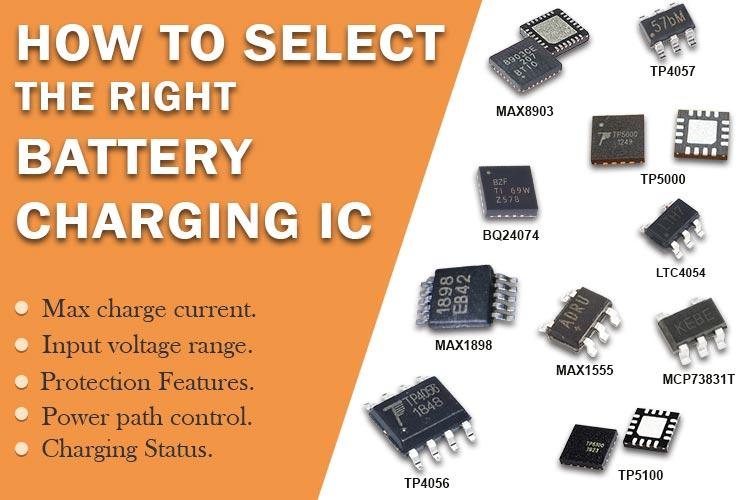
With the growing popularity of portable electronic devices powered by rechargeable batteries, selecting the appropriate battery-charging integrated circuit (IC) is crucial for efficient and safe charging. Whether you're designing a smartphone, a wearable device, or any other gadget that relies on battery power, choosing the right charging IC can significantly impact the performance and reliability of your product. In this guide, we'll discuss the key factors to consider when selecting a Li-ion battery charging IC and explore options with and without power path control.
Understanding Li-Ion Battery Charging ICs
Li-ion battery charging ICs play a vital role in managing the charging process, ensuring safe and efficient power delivery to the battery. Here are some essential considerations when evaluating these ICs:
- Maximum charge current: The Maximum charge current determines how quickly the battery can be charged without damaging it. It's essential to choose an IC that supports the desired charge current while considering the battery's specifications and safety requirements.
- Voltage and Current Regulation: Look for charging ICs that provide precise voltage and current regulation to prevent overcharging, which can degrade battery life or cause safety hazards.
- Temperature Monitoring: Integrated temperature monitoring features help prevent overheating during charging, enhancing safety and prolonging battery life.
- Safety Features: Ensure the IC includes built-in protection mechanisms such as overvoltage protection, overcurrent protection, and thermal shutdown to safeguard both the battery and the charging circuitry.
- Efficiency: Opt for charging ICs with high efficiency to minimize power losses and maximize battery life.
- Compatibility: Consider the compatibility of the charging IC with your battery chemistry (e.g., Li-ion, Li-Polymer) and voltage requirements.
- Charge termination voltage: For each battery depending on various factors such as battery chemistry/composition, manufacturing techniques, and targeted usage, the full charge voltage will be different. Even though most common Li-ion or Li-po batteries have a typical full charge voltage of 4.2V, it may not be the case for all the batteries in the market. So, for this reason, there are multiple variants of the charging ICs available with different full charge termination voltages. So, select the chip variant depending on the specific battery you have.
Li-Ion Charger ICs with Power Path Control
Li-ion charger ICs with power path control offer additional benefits, particularly in applications where the device needs to operate while charging. Power path control allows the device to draw power directly from the input source (e.g., USB port) while simultaneously charging the battery. This feature ensures uninterrupted operation and faster charging times, making it ideal for portable devices with high power demands. When selecting a Li-ion charger IC with power path control, pay attention to:
- Input Power Handling: Consider the maximum input voltage and current supported by the IC to ensure compatibility with your power source (e.g., USB charger).
- Load Management: Evaluate the IC's load management capabilities to ensure seamless power delivery to both the device and the battery during charging.
- Efficiency in Power Path Mode: Look for ICs with high efficiency in power path mode to minimize power losses and optimize charging performance.
Li-Ion Charger ICs without Power Path Control
While Li-ion charger ICs without power path control may lack the ability to power the device directly from the input source during charging, they are still suitable for many applications. These ICs are often more straightforward in design and may offer cost savings for less demanding applications where uninterrupted operation during charging is not essential. When considering Li-ion charger ICs without power path control, focus on:
- Charging Efficiency: Choose ICs with high charging efficiency to maximize battery life and minimize charging time.
- Safety Features: Ensure the IC includes comprehensive safety features to protect the battery and charging circuitry from potential hazards.
- Compact Design: Look for compact and space-efficient ICs suitable for integration into small electronic devices.
Popular Li Ion Battery-Charging ICs
Now let’s look at some of the popular battery-charging ICs that are widely used in the electronics community.
TP4056 Standalone Linear Battery Charger IC
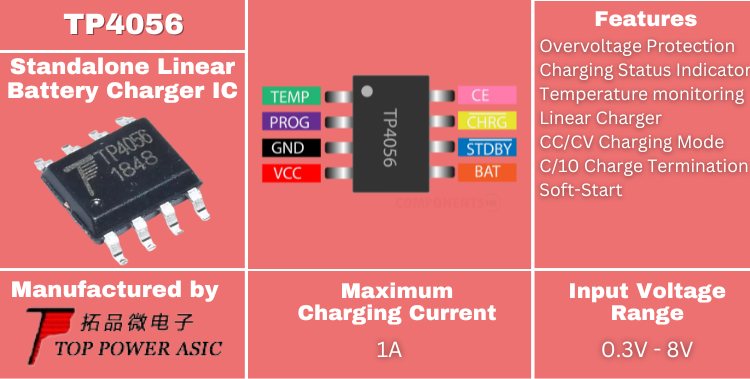
The TP4056 is one of the most widely used Li-ion battery charger ICs known for its simplicity and cost-effectiveness. It supports single-cell lithium-ion or lithium polymer batteries and operates with a constant current/constant voltage charging algorithm. The TP4056A offers basic protection features such as overcharge protection and over-discharge protection, making it suitable for a wide range of low-power applications. It can charge the batteries with up to 1A of current. Thermal feedback automatically adjusts the charge current to limit chip temperature during high power operation or high ambient temperature conditions.
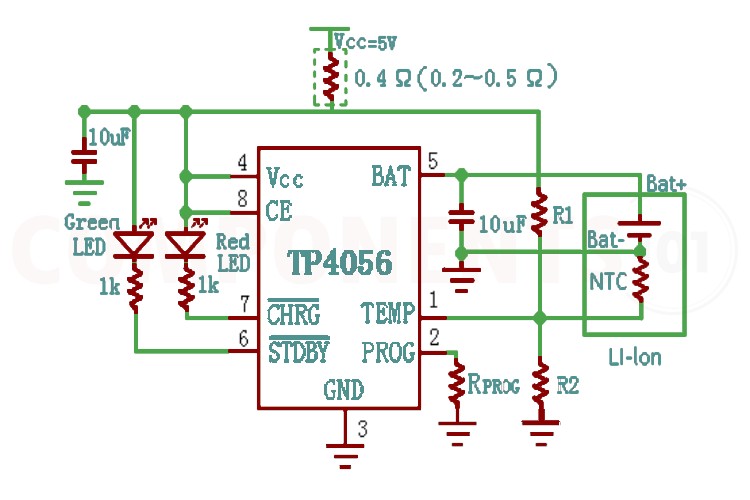
The charging voltage is fixed at 4.2V, and the charging current can be externally set by a resistor. When the charging current drops to the set value of 1/10 after reaching the final float voltage, the TP4056 will automatically terminate the charging cycle. It also features status output for both charging and full charge indication. They are cheap and available as bare-bone chips as well as modules. Even though the actual manufacturer of the TP4056A is Top Power ASIC, you can find them from various manufacturers with the same or different naming conventions such as TC4056 or TC4056A. But all of them seem to function the same way. The TP4056 is manufactured by Top Power ASIC.
TP4057 Standalone Liner Battery Charger IC
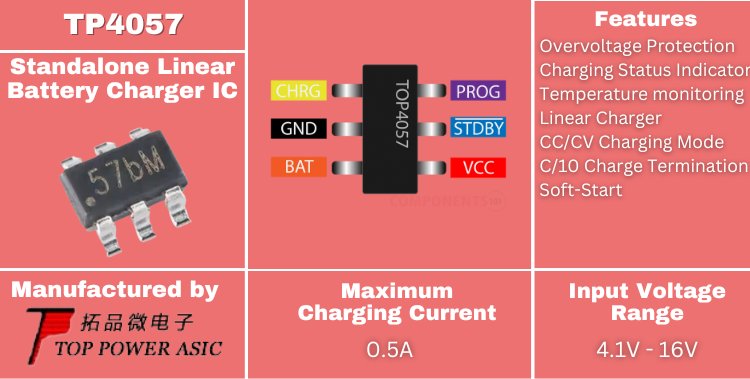
Similar to the TP4056, the TP4057 is a single-cell Li-ion battery charger IC with a simple and straightforward design. It is also from the same manufacturer as the TP4056 and the only difference between them is the maximum charging current. The TP4057 is limited to 500mA whereas the TP4056 can handle up to 1A of charging current. It features integrated power MOSFETs and thermal regulation, allowing for efficient and safe charging of lithium-ion or lithium-polymer batteries. The TP4057 is commonly used in portable electronic devices where space and cost are primary concerns. Similar to TP4056 the thermal feedback automatically adjusts the charge current to limit chip temperature during high power operation or high ambient temperature conditions.
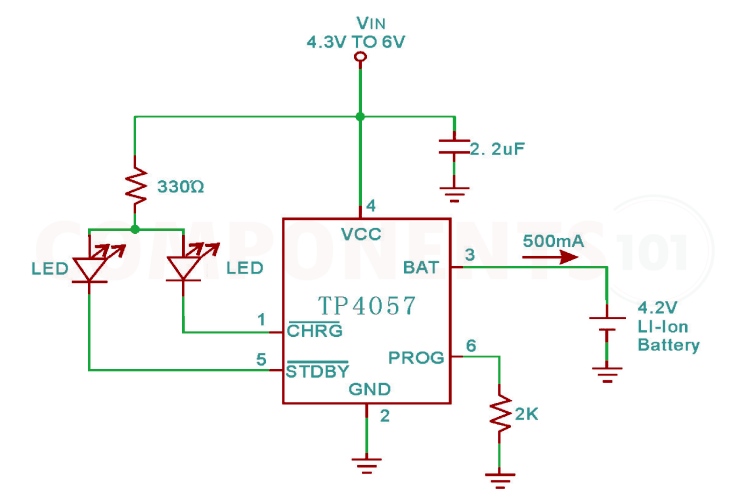
The full voltage is fixed at 4.2V, and the charging current can be externally set by a resistor. When the battery reaches 4.2V, the charging current drops to the set value of 1/10, and the TP4057 will automatically terminate charging. When the input voltage (AC adapter or USB power) is removed, the TP4057 automatically enters a low current state with a battery leakage current below 2uA. Other features of the TP4057 include a charge current monitor, under voltage lockout, automatic recharge, and two status pins that indicate the end of charge and input voltage input. The TP4057 is manufactured by Top Power ASIC.
TP5100 NMC and LFP Li-ion Battery Charger IC
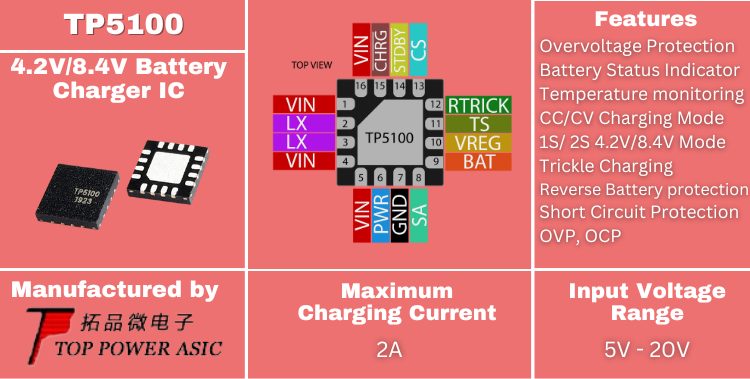
The TP5100 is a versatile Li-ion battery charger IC capable of charging single-cell (4.2V)or multi-cell(8.4V) lithium-ion batteries with high efficiency. It offers programmable charging parameters and supports input voltages up to 20V, making it suitable for a wide range of applications. Its ultra-compact QFN16 package and simple external circuit, make TP5100 ideal for portable equipment and large current charging management applications. Meanwhile, The TP5100 incorporates advanced safety features such as built-in input overcurrent, under-voltage protection, over-temperature protection, short circuit protection, battery temperature monitoring, and reverse battery protection.
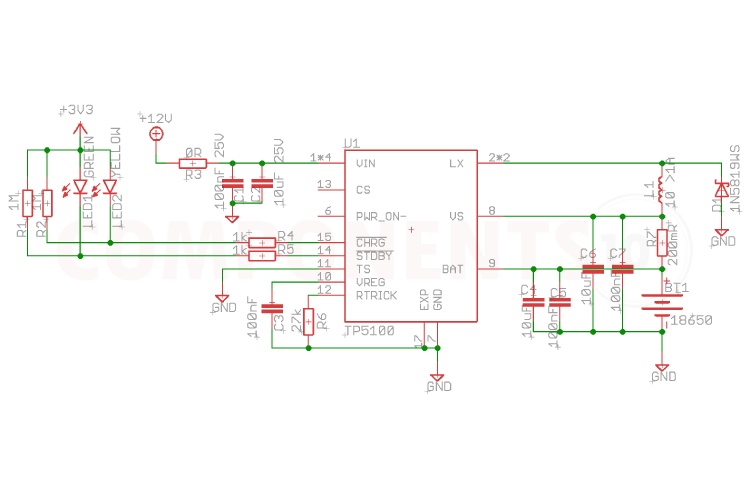
TP5100 with a frequency of 400kHz switching mode makes it possible to use a smaller outer Suo device and the large current charging still maintains a smaller amount of heat. The charging current can be anywhere from 0.1A to 2A, which can be configured using an external current sense resistor. The TP5100 is manufactured by Top Power ASIC.
TP5000 Multi Chemistry Battery Charger IC
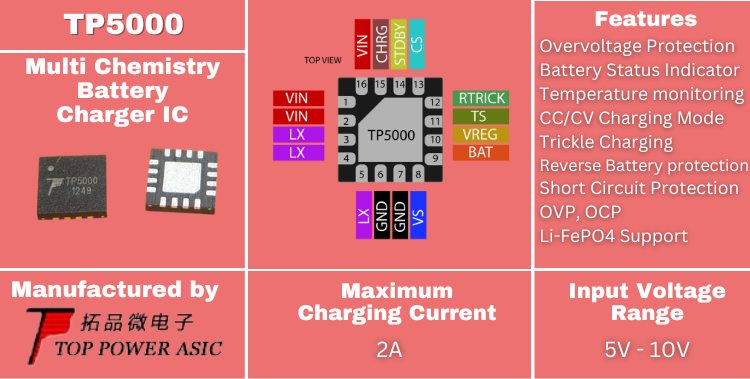
The TP5000 is another popular Li-ion battery charger IC is known for its high efficiency and reliability. It supports single-cell lithium-ion or lithium polymer batteries with 3.6 or 4.2V termination voltages. It also offers adjustable charging parameters to accommodate various battery sizes and chemistries. The TP5000 includes built-in thermal regulation and overcharge protection, ensuring safe and efficient charging in diverse applications. It can accept wide input voltage up to 10V. It uses an 800KHz switch for the buck operation effectively making it easier to use smaller components even during high-power operations.
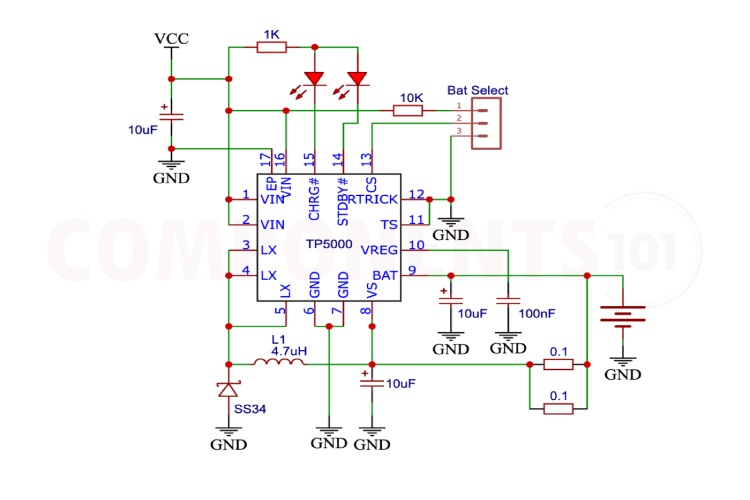
The charging current can be adjusted from 0.1A to 2A using the external current sense resistor. The CS pin is used for selection between lithium-ion or iron phosphate cells. The TP5000 is manufactured by Top Power ASIC.
MCP73831 Single Cell Battery Charger IC
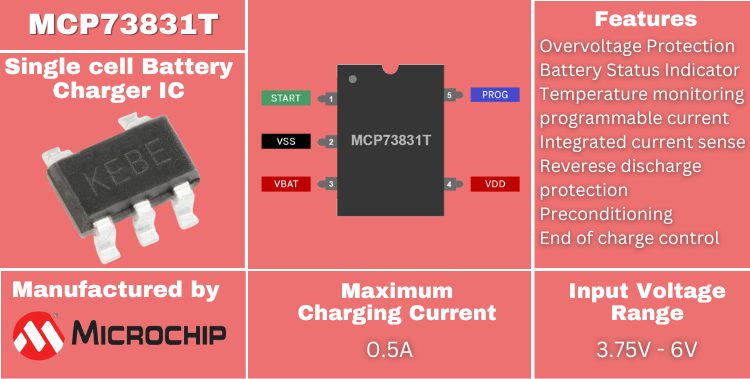 The MCP73831 is a compact and efficient Li-ion battery charger IC designed for single-cell lithium-ion or lithium polymer batteries. This single-cell Li-ion battery charger IC features a compact footprint and low external component count. It operates with a constant current/constant voltage charging algorithm and includes integrated safety features such as thermal shutdown and reverse battery protection. The MCP73831 is suitable for space-constrained applications requiring reliable and efficient battery charging. The MCP73831 complies with all the requirements governing the USB power bus for applications charging from a USB port.
The MCP73831 is a compact and efficient Li-ion battery charger IC designed for single-cell lithium-ion or lithium polymer batteries. This single-cell Li-ion battery charger IC features a compact footprint and low external component count. It operates with a constant current/constant voltage charging algorithm and includes integrated safety features such as thermal shutdown and reverse battery protection. The MCP73831 is suitable for space-constrained applications requiring reliable and efficient battery charging. The MCP73831 complies with all the requirements governing the USB power bus for applications charging from a USB port. 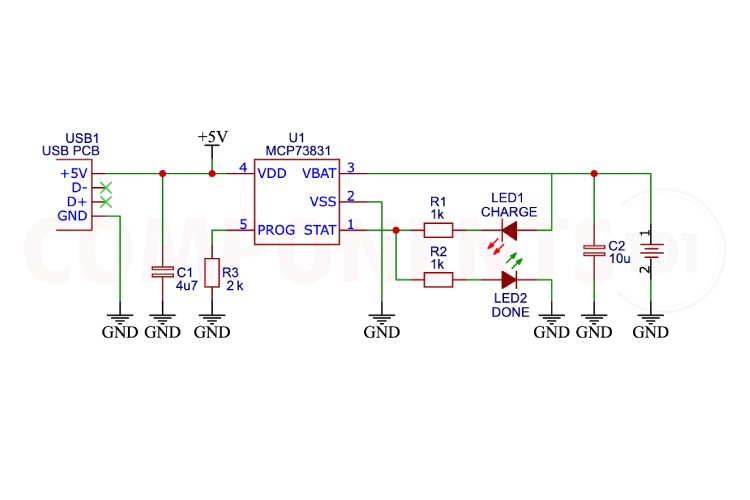
The charge algorithm used by the MCP73831 is constant-current/constant voltage with configurable preconditioning and charge termination. To meet evolving battery charging needs, the constant voltage regulation is fixed with four options: 4.20V, 4.35V, 4.40V, or 4.50V. One external resistor is used to set the constant current value. The MCP73831 limits the charge current based on die temperature during high power or high ambient conditions. This thermal regulation optimizes the charge cycle time while maintaining device reliability. The MCP73831 is manufactured by Microchip.
TC4054 Linear Battery Charger IC
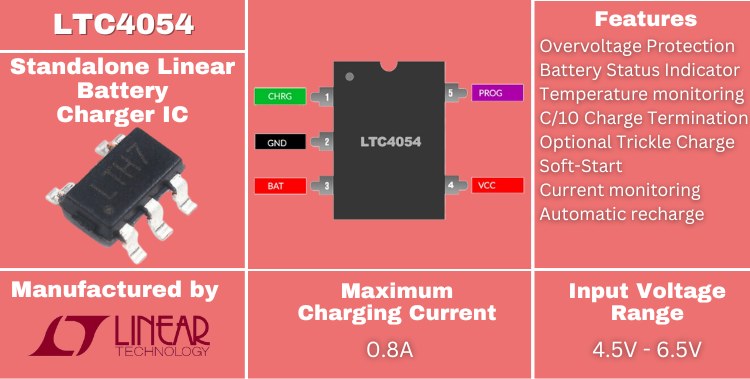
The LTC4054 is a high-performance Li-ion battery charger IC designed for single-cell lithium-ion or lithium polymer batteries. It features precision voltage regulation and programmable charge current, allowing for precise control over the charging process. It features internal MOSFET and doesn't require any sense resistors. It also features thermal regulation during high-power operations. The charge voltage is fixed at 4.2V and the charge current can be programmed using an external resistor. When the input supply is removed, the LTC4054 automatically enters a low current state, dropping the battery drain current to less than 2µA.
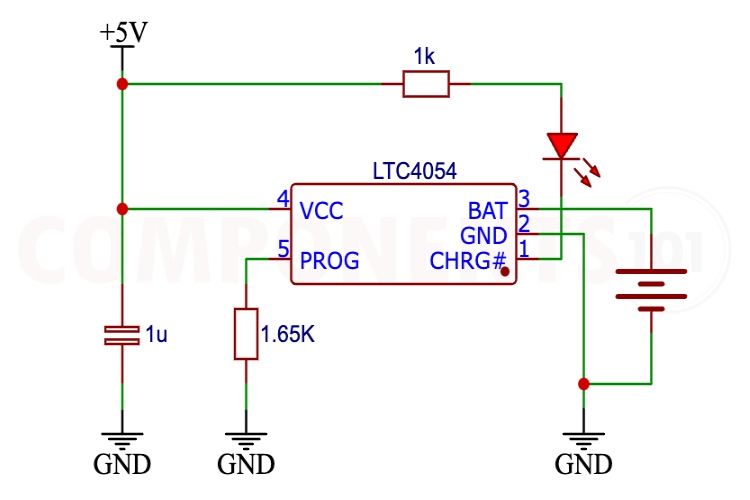
The LTC4054 can also be put into shutdown mode, reducing the supply current to 25µA. The LTC4054 incorporates advanced safety features such as battery temperature monitoring and charge termination timers, ensuring optimal performance and reliability in demanding applications. The LTC4054 is manufactured by Linear Technology.
MAX1898 Linear Battery Charger IC
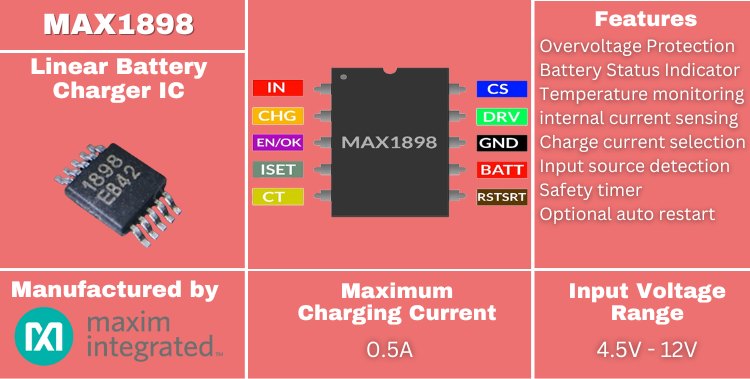
The MAX1898 is a multi-chemistry battery charger IC capable of charging single-cell lithium-ion, lithium polymer, and nickel-based batteries. It offers a wide input voltage range and supports fast charging with programmable charging parameters. It delivers precise constant-current/constant-voltage charging with exceptional battery regulation voltage accuracy of ±0.75%, promoting optimal battery performance and cycle life.
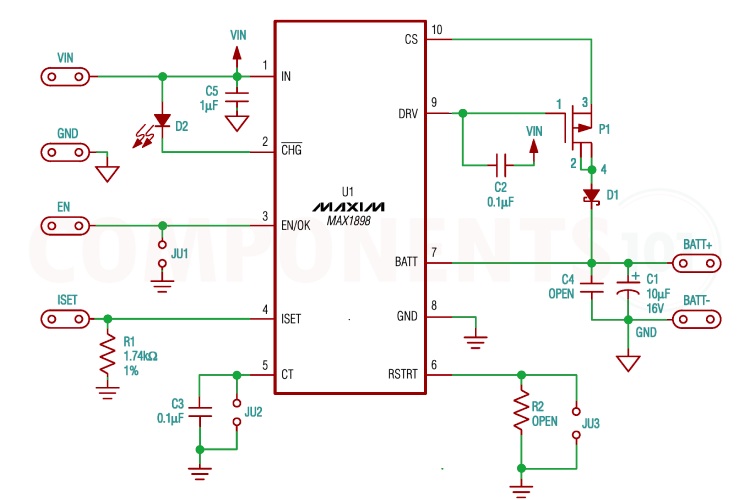
Moreover, the MAX1898 eliminates the need for external current-sense resistors, thanks to its internal current-sensing capability. The MAX1898 includes comprehensive safety features such as thermal regulation, overvoltage protection, and battery temperature monitoring, making it suitable for a variety of portable electronic devices. The MAX1898 is manufactured by Maxim Integrated.
MAX1555 Dual Input Battery Charger IC
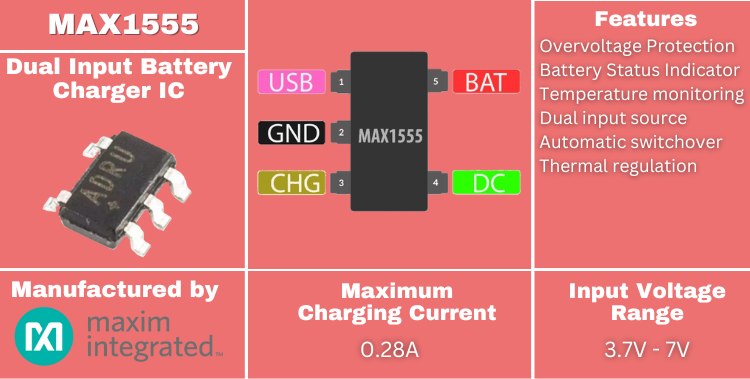
The MAX1555 is a compact and efficient Li-ion battery charger IC designed for single-cell lithium-ion or lithium polymer batteries. It operates with a constant current/constant voltage charging algorithm and includes integrated safety features such as thermal regulation and reverse battery protection. When the IC exceeds the temperature limit it will decrease the charging current automatically. The MAX1555 can provide a charging current of up to 280mA, which is suitable for small-sized batteries The MAX1555 comes in a small package, making it ideal for use in compact electronic devices where space is limited. It's commonly used in portable electronic devices like smartphones, tablets, and digital cameras to charge the battery safely and efficiently.
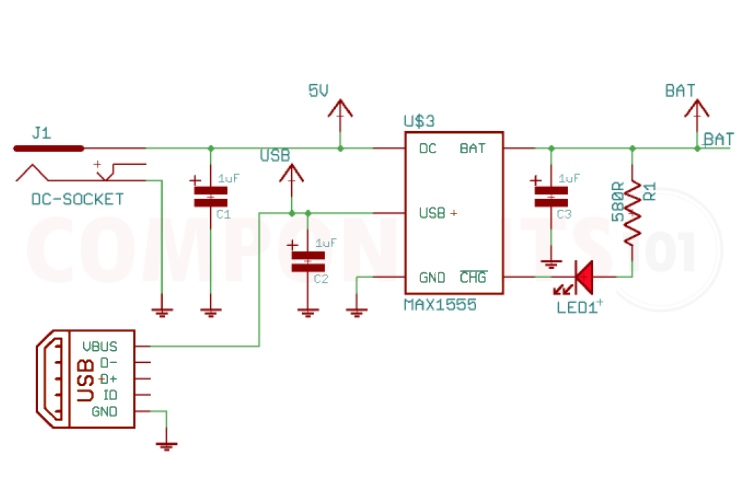
And here is a practical circuit built around the MAX1555. As mentioned earlier the MAX1555 can take two input sources. So, we have provided both DC input jack and micro-USB input to the circuit. From the DC input, the IC will be able to charge the battery with a maximum current of 280mA, while with the USB input, it is limited to 100mA. The MAX1555 is manufactured by Maxim Integrated.
BQ24074 Single Cell Battery Charger IC
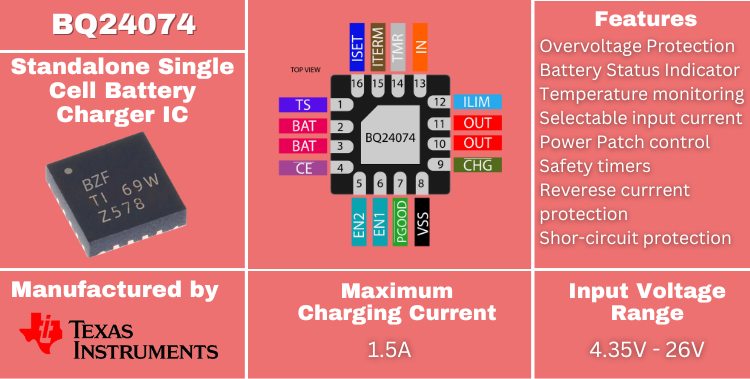
The BQ24074 is a versatile Li-ion battery charger IC capable of charging single-cell lithium-ion or lithium polymer batteries with high efficiency. It offers a wide input voltage range and supports USB On-The-Go (OTG) functionality. This is particularly useful in applications where the battery must be charged, and the system needs to be powered simultaneously. The BQ24074 supports charging current up to 1.5 A. This chip can handle a higher input voltage of up to 28V and input overvoltage protection which is very useful in unregulated adapters. The battery voltage threshold is set at 4.2V. Additionally, the input dynamic power management prevents the IC from crashing incorrectly configured USB sources.
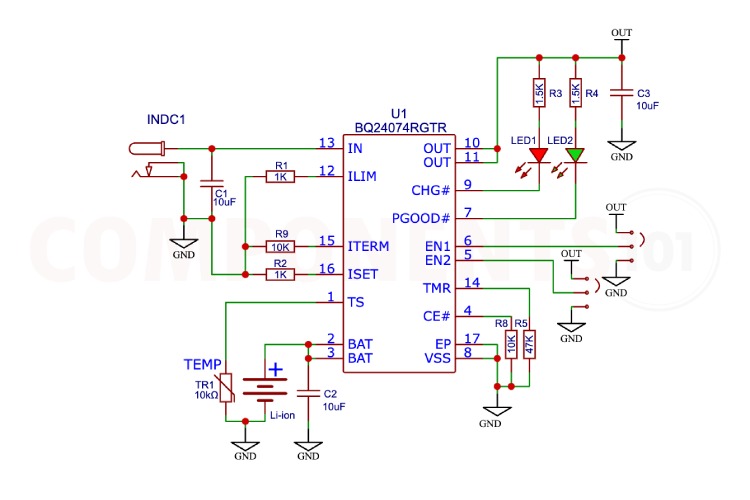
The battery can be charged in three phases using this IC: conditioning, constant current, and constant voltage. In all cases, the BQ24074 monitors the IC temperature and reduces the charge current if the temperature threshold is exceeded. The BQ24074 includes integrated safety features such as thermal regulation, overvoltage protection, and charge termination based on voltage and current thresholds, ensuring safe and reliable charging in diverse applications. Here this practical charger circuit is built around the BQ24074, with the charge current set to 1A. The BQ24074 is manufactured by Texas Instruments.
MAX8903 Dual Input Battery Charger IC
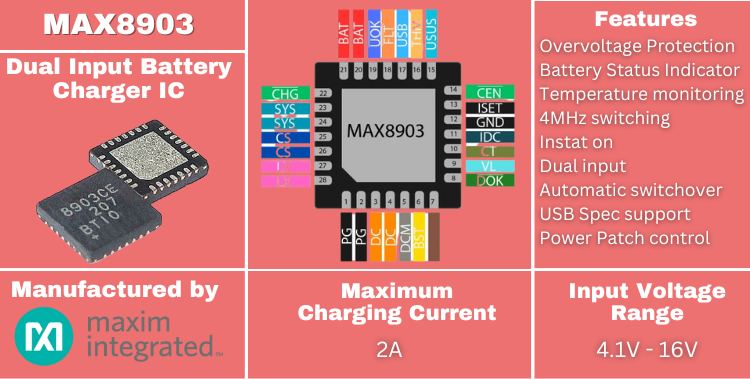
The MAX8903 is a dual-input charger which supports separate DC and USB inputs. This switch mode charger uses high-speed switching to eliminate heat and decrease external components. No external MOSFETs, blocking diodes, or current-sense resistors are required to work MAX8903. The MAX8903 has smart power control, making the IC best for USB or adapter power. Battery charge current can be set up to 2A while the USB input current can be set to 100mA or 500mA. The built-in step-down converter supplies up to 2A to the system, the battery, or a combination of both.
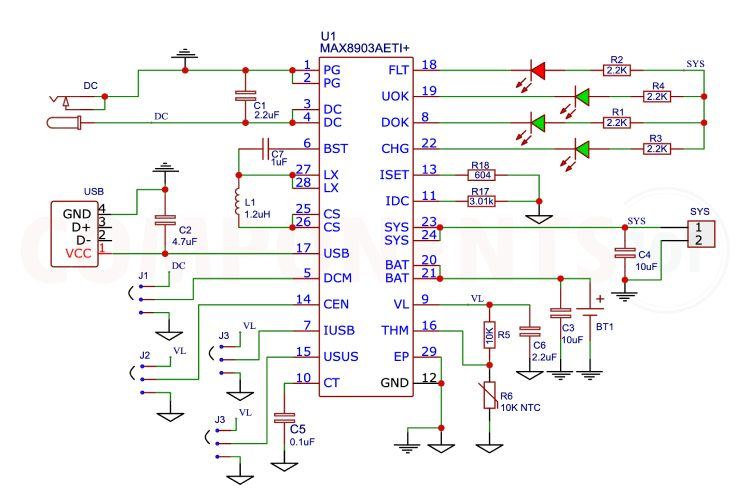
A USB charge input can charge the battery and power the system from a USB power source. When powered from USB or the DC input, system load current peaks that exceed what can be supplied by the input are supplemented by the battery. The MAX8903 also features overvoltage protection, charge status and fault outputs, power-OK monitors, and a battery thermistor monitor. In addition, it has thermal limiting which reduces the battery charge current and prevents charger overheating. Here is a simple circuit diagram for a MAX8903 charger. The MAX8903 is manufactured by Maxim Integrated.
Comparison between the Popular Li Ion Battery Charger ICs
Now lets’ compare all of them together so that we can choose one more easily.
| Component | Input Voltage Range | Charge Current | Battery Chemistry | Power Path | Features |
| TP4056 | 4V - 8V | Up to 1A | Li-Ion | No | Low external component count, linear charge management, automatic recharge, thermal regulation |
| TP4057 | 4V - 9V | Up to 1A | Li-Ion | No | Programmable charge current, thermal regulation, automatic recharge, overvoltage protection |
| TP5100 | 4.5V - 18V | Up to 2A | Li-Ion | No | Programmable charge current, thermal regulation, overvoltage protection, battery temperature monitoring |
| TP5000 | 4V - 9V | Up to 2A | Li-Ion, Li-FePO4 | No | Automatic recharge, overvoltage protection, over-temperature protection, charge status indicators |
| MCP73831 | 3.75V - 6V | Up to 500mA | Li-Ion | No | Tiny package, automatic charge termination, thermal regulation, charge status output |
| LTC4054 | 4.25V - 6.5V | Up to 800mA | Li-Ion | No | Low external component count, automatic recharge, thermal regulation, charge status indicators |
| MAX1898 | 4.5V - 12V | Up to 500mA | Li-Ion | No | High efficiency switching charger, overvoltage protection, thermal regulation, charge status indicators. |
| MAX1555 | 3.7V - 7V | Up to 280mA | Li-Ion | No | Charge current programmable up to 0.3A, thermal regulation, automatic recharge, low dropout voltage |
| BQ24074 | 4.35V - 26V | Up to 1.5A | Li-Ion | Yes | USB On-the-Go (OTG) support, integrated USB detection, overvoltage protection, charge status indicators |
| MAX8903 | 4.15V - 16V | Up to 2A | Li-Ion | Yes | High efficiency switching charger, overvoltage protection, thermal regulation, charge status indicators. |








